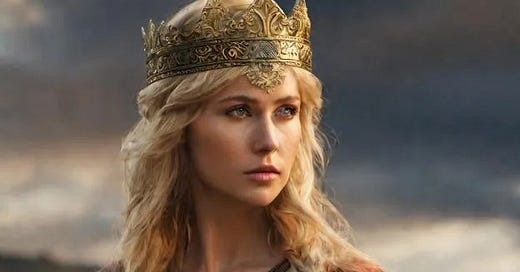"The Tale of Beowulf" stands as a cornerstone of early English literature, a saga embellished with heroism, conflict, and the intricate dynamics of Anglo-Saxon society.
At its heart, Beowulf, the protagonist, embodies the ideals of a warrior-hero, but a deeper look reveals the nuanced roles of other characters, such as Queen Wealhtheow. Her presence, though seemingly peripheral, plays a critical role in the societal fabric and richness of the narrative.
In the tale, Beowulf, a young warrior from Geatland, arrives at the Danish court of King Hrothgar to assist in defeating Grendel, a monstrous creature terrorizing the kingdom. After his triumph over Grendel and later, Grendel's mother, Beowulf earns great honor. The plot, rich in battles and feats of strength, paints a vivid picture of court life, where Queen Wealhtheow emerges as that pivotal figure.
Wealhtheow's role, primarily as hostess and peace-weaver, is crucial in the context of the societal norms of the time. She is portrayed as a dignified, gracious hostess, ensuring the well-being of guests, which was a key responsibility in a culture that valued hospitality immensely. Her actions during the feasts, particularly when she presents the cup first to Hrothgar and then to Beowulf and other warriors, signify her role in maintaining societal order and harmony. This ritualistic cup-bearing was not merely a gesture of hospitality but also a symbol of unity and allegiance among the warriors.
Wealhtheow is an embodiment of the peace-weaver, a role women often played in medieval societies. Through marriage alliances, they were instrumental in forging ties between tribes or clans, a practice essential for maintaining peace in a fractious world. Wealhtheow herself was a peace-weaver, originally from the Wulfing tribe, and her marriage to Hrothgar was likely a part of such an alliance.
Her diplomatic acumen is evident during the feast when she addresses Beowulf. Her words, though courteous, carry the weight of her concerns about the succession of the throne and the well-being of her sons. This scene highlights her political awareness and her subtle influence in the realm's affairs. She recognizes the potential threat that a hero like Beowulf could pose to her sons’ future, thus revealing the precarious nature of power and succession in those times.
Wealhtheow’s character also serves as a counterbalance to the predominantly masculine world of "Beowulf." Her presence brings a different perspective, one that emphasizes diplomacy, familial concerns, and societal cohesion, as opposed to the glorification of martial prowess alone. This contrast is not just a narrative device but a reflection of the gender dynamics of the era.
In analyzing Wealhtheow’s role, it is important to consider the historical and literary context of "Beowulf." Composed during a time when oral traditions dominated, the poem blends historical elements with mythic and legendary aspects. Wealhtheow, while a historical figure, is also a literary construct, representing the idealized attributes of a queen and a noblewoman in Anglo-Saxon society.
Her portrayal in "Beowulf" is indicative of the multifaceted roles women played in these early medieval societies. Despite the limitations imposed by a patriarchal structure, figures like Wealhtheow demonstrate agency and influence within their scope, contributing significantly to the social and political fabric.
Queen Wealhtheow, while not a warrior-hero like Beowulf, is integral to the narrative's depth and realism. Her role transcends the boundaries of mere hospitality, encompassing political sagacity and societal stability. In a tale celebrated for its heroic exploits, Wealhtheow stands as a testament to the nuanced and vital roles women played in the tapestry of Anglo-Saxon lore and history. Through her character, "The Tale of Beowulf" not only celebrates heroic deeds but also highlights the importance of wisdom, diplomacy, and the often-understated power wielded by women in shaping the destinies of kingdoms.






This is fascinating Laurence. I had forgotten about Wealhtheow! I'll have to re-read the poem. She was never mentioned of course when I studied Anglo Saxon in college in the late 70s. Your reading of her highlights her significance which also counterpoints the more famous other female character in the poem, Grendel's mother!